|
|
|
Sort Order |
|
|
|
Items / Page
|
|
|
|
|
|
|
| Srl | Item |
| 1 |
ID:
193192
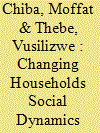

|
|
|
|
|
| Summary/Abstract |
This article explores household-level social dynamics of change and their causal effects on future agricultural practices and food security. It does this by employing a place-specific qualitative research methodology in two rural settlements in Shamva District, Mashonaland Central Province. It reveals how these changes have impacted negatively on farm households’ command of assets, including draft power, labour and social networks. Households that had a long history of agricultural excellence started to experience declines in their agriculture, while new households encountered new vulnerabilities. The article concludes by cautioning against any policy that ignores the household as a production unit in Zimbabwe’s agriculture.
|
|
|
|
|
|
|
|
|
|
|
|
|
|
|
|
| 2 |
ID:
108614
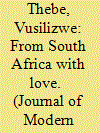

|
|
|
|
|
| Publication |
2011.
|
| Summary/Abstract |
In the 1980s and early 1990s, sending remittances from South Africa posed major challenges for Ndebele migrants. As a result households receiving remittances only did so at irregular intervals. With increased diasporisation into South Africa, it was to be expected that new channels would open up. This article explores what is known as the malayisha system, its role and significance as an informal channel of remittances into Ndebele society. It argues that the system bridged the geographical gap between Matabeleland and Johannesburg, averting food insecurity and poverty for semi-proletarian households in Matabeleland. By facilitating the movement of goods and people between Matabeleland and South Africa, the system became instrumental in the quest of households to reconstruct their livelihoods after the destruction of their rural-urban-based livelihoods in Zimbabwe due to perennial droughts and ESAP. As a result, the services of omalayisha are highly sought-after, by both the migrant community in South Africa and households in Matabeleland.
|
|
|
|
|
|
|
|
|
|
|
|
|
|
|
|
| 3 |
ID:
179113
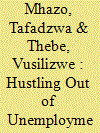

|
|
|
|
|
| Summary/Abstract |
Youth unemployment has emerged as a major policy issue in the recent past. Within policy circles two solutions have been proposed: first, investing in youth education, and second, incorporating youth into agriculture. Our thesis, backed by a long history of proletarianisation, is that perceptions of work and agriculture, which have become deeply entrenched in society, tend to undermine any prospects of educated youth engaging in agriculture-based livelihoods. We develop our argument by focusing on the experiences, responses and livelihood pathways of young university graduates in the city of Bulawayo. We show that young graduate youth prefer livelihood activities which maintain their status as educated citizens, and that agriculture does not confer such status. We argue that young graduates’ aspirations and livelihood pathways are often dictated by societal attitudes and views of what is an acceptable occupation. In this regard, our thesis contradicts the widespread faith in agriculture placed by policymakers in Africa.
|
|
|
|
|
|
|
|
|
|
|
|
|
|
|
|
| 4 |
ID:
154237
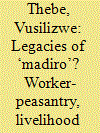

|
|
|
|
|
| Summary/Abstract |
This paper examines acts of land ‘self-provisioning’ (‘siziphile’ land occupations) and ‘radical land restitution’ (of land previously annexed from people by the local authority for a pilot grazing project) by villagers in a communal area in Lupane District in north-western Zimbabwe. Situating these occurrences within the wider and historical context of ‘madiro’ (freedom farming and unauthorised development of settlements) and Matabeleland land politics and semi-proletarianisation, it stresses the livelihood history of households, the disappointments with local job opportunities and destruction of urban-based livelihoods in a crumbling economy, and the accompanying crisis of communal area agriculture. It concludes that these factors provided a real threat to semi-proletarianisation. By self-provisioning of the land the overriding concern of villagers was to maintain a certain level of livelihood survival, even if it was at odds with their livelihood strategies, while they sought opportunities to maintain semi-proletarianisation.
|
|
|
|
|
|
|
|
|
|
|
|
|
|
|
|
| 5 |
ID:
162425
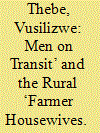

|
|
|
|
|
| Summary/Abstract |
Studies on migrant-labour systems have focused on the negatives, particularly on women left behind as guardians of men’s interests, but with no real control. My extended research on former migrant-labour societies in north-western Zimbabwe has challenged this ‘doomsday’ narrative. It did not only reveal the feminisation of household and societal decisions, but also how the migration of men has liberated women and allowed them to play crucial roles within the household and society systems. My study thus illuminates differences between rural societies and cautions against the risks of over-generalisation when looking at the relationship between women and migration. It stresses the importance of migration on development, and the empowerment potential on women who take up prominent positions in the household and in society decision-making structures.
|
|
|
|
|
|
|
|
|
|
|
|
|
|
|
|
|
|
|
|
|